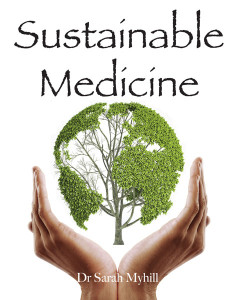I have worked with Sarah Myhill for over 15 years, both as a Chronic Fatigue Syndrome (CFS) patient and also academically. As such, I have witnessed the crystallisation of the ideas that led to the concept and writing of Sustainable Medicine from both sides of the fence. These ideas were applied to me personally and I also saw them develop in my role as editor of Sarah’s writings, and also of her website – http://www.drmyhill.co.uk/wiki/Main_Page
Sustainable Medicine: swinging the pendulum back in favour of the patient
Sustainable Medicine follows a logical path, with the ultimate goal of empowering readers to take charge of their own health. This empowerment will not only help to heal diseases already present in readers, but also, and equally crucially, will lay down a route map for the healthy to remain healthy. It is for everyone.

The starting point of this journey was the realisation that 21st Century Medicine is not working for the benefit of the patient. So much of modern medicine is driven by vested financial interests that the patient is almost completely forgotten in this process. The patient, the one who knows their body, and the one who is suffering from the symptoms and diseases, is often ignored or, at best, side-lined or even patronised, in the diagnosis and treatment of their disease. Worse than this, modern medicine is not “sustainable”, either for society or the patient, because the use of powerful symptom suppressing drugs often escalates the disease process, rather than reversing it.
Sustainable Medicine has the simply stated objective of swinging the pendulum back in favour of the patient and away from those vested interests.
Sarah Myhill is an inquisitive person. As a patient, you notice this the very first time you speak with her or meet her. She is not like other doctors; there is a genuine desire to know you, and your life, and where you have worked and lived, and so on. In short, Sarah wants to know the ‘whole’ you; she is not a “Symptom List” doctor, by which I mean a physician who asks for your symptoms and then “replies” with a prescription pad. Put crudely, by knowing you better, Sarah can treat you better, although this underplays her most endearing quality; she likes her patients and treats them as equals.
This innate inquisitiveness naturally led Sarah always to ask the question ‘why?’ and in the practice of medicine this question is translated into a quest to find the root causes of disease and symptoms.
This is where Sarah’s 30 years of clinical experience made its mark known and also where the “logical path” was laid down.
First, Sustainable Medicine discusses symptoms, not as something to be immediately squashed with powerful prescription drugs, but rather as signposts as to what may be going wrong. Symptoms are the early warning system of the body that all is not right.
The next step along this logical path is an exposition of what mechanisms may be causing these symptoms and how one can identify which particular mechanisms are at play in this patient. The identification of these mechanisms is achieved by tests and clinical signs and symptoms.
At this point along the logical path, the reader will have identified their symptoms and also isolated the mechanisms causing those symptoms. The next step is to lay out the “tools of the trade”, that is the interventions, that can be put in place to treat those mechanisms as identified. These interventions are “sustainable” in that they reverse, not escalate, disease processes.
The logical path is now complete:
Symptoms => Mechanisms of disease => Sustainable Treatments (“tools of the trade”) to treat and reverse these Mechanisms
By way of example, Sustainable Medicine then looks at very many individual diseases, identifies the underlying mechanisms of these diseases and then applies the “tools of the trade” required to reverse these disease processes. To further illustrate this logical path, Sarah concludes with some case studies of her own patients, ranging from diseases such as chronic lymphatic leukaemia to inflammatory arthritis to CFS.
Sustainable Medicine was launched at a Biocare Advanced Education Day on 13 July 2015, where Sarah detailed her views on the mechanisms and sustainable treatments as applied to CFS, as well as discussing the critical roles played by inflammation and immune system issues in many modern diseases.
Craig Robinson, Editor, Sustainable Medicine.
Read the first chapter of Sustainable Medicine for free here or order your copy. Want to tell us what you think of the book? Leave a review on Amazon, and if you have any questions you can contact Craig and other followers of Dr Myhill’s protocol for CFS in the Facebook group.
